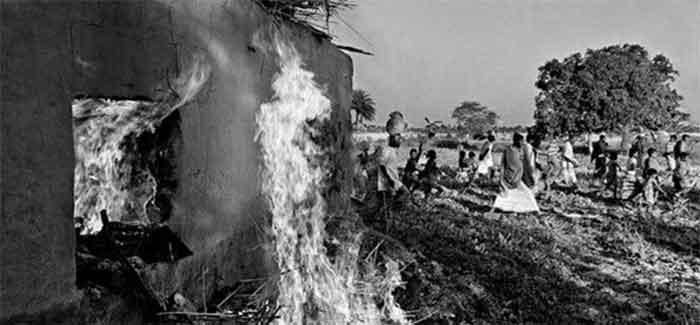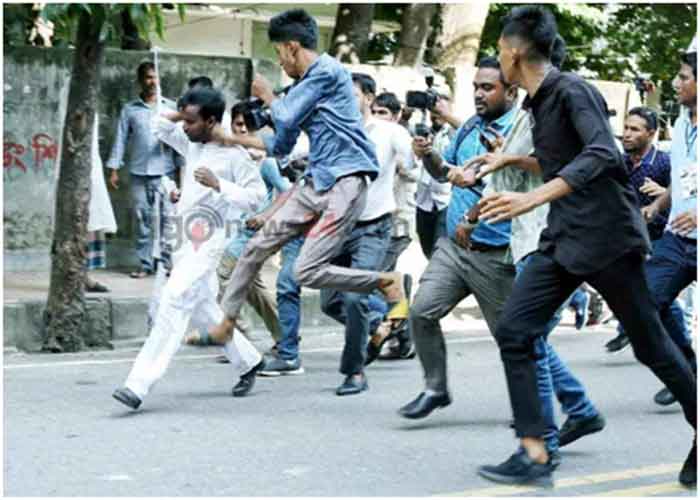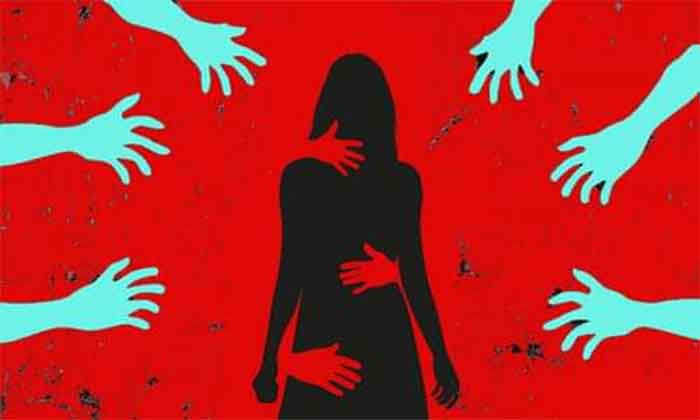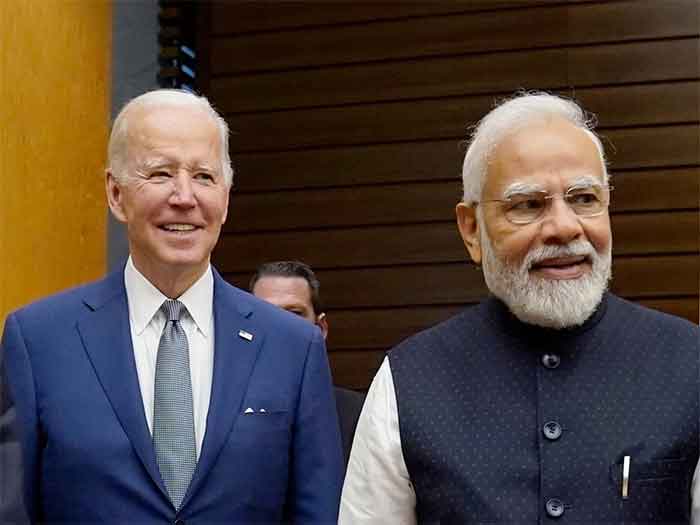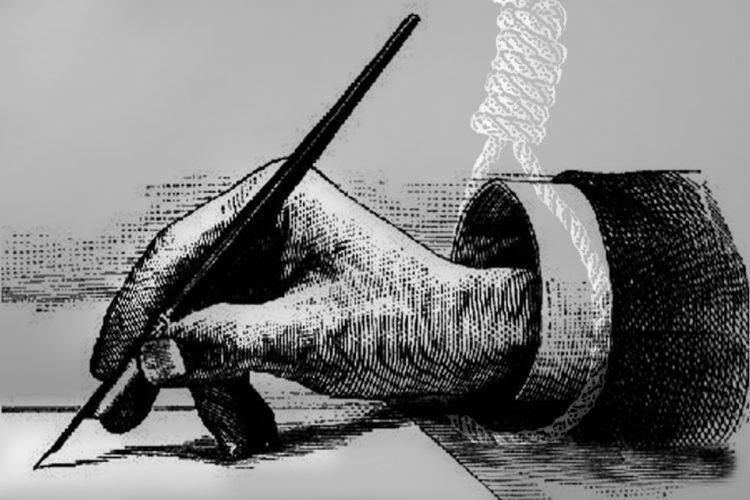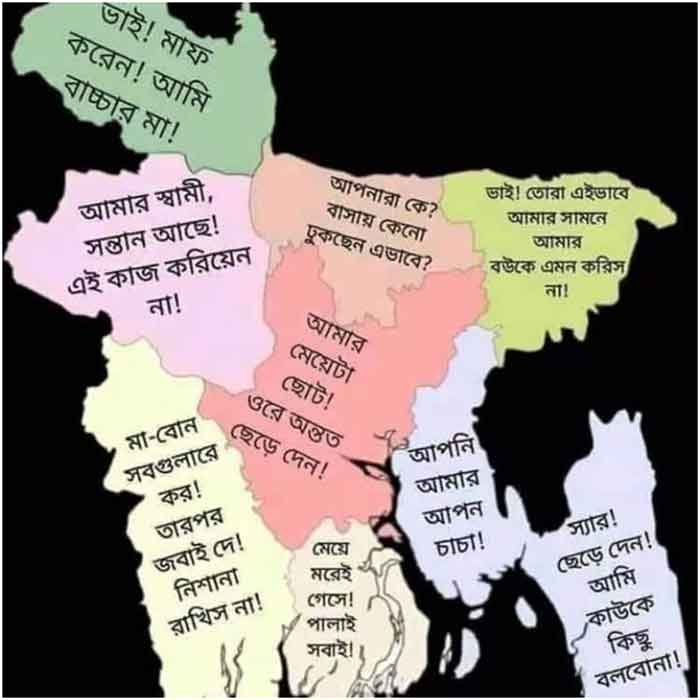
I don’t know who drew this this rape-map of Bangladesh, but this is a telling geography of rape epidemic which as can be see here, has spread widely and reached every nook and corner of the country.
The scrolls on each district which are in vernacular are appeals to the predators from the rape victims – desperate pleas to dissuade the perpetrators from committing the vile crime.
The pleas of the victims that ranged from 3 year to 72-year-old tell the story of their fright and utter helplessness who tried their utmost to appeal to the conscious of the rapists to pleading for example, “Please leave me, I am a mother of my child”, “Please spare the little girl, she is too young” etc. etc. No, none of these helped – rapes did occur and with impunity in all the cases.
The rape-map also included statements of perpetrators, for example – “do it to all of them, the mothers and the daughters and then kill them to make sure that there are no witnesses left to report” etc. that demonstrate the length these criminals were willing to go to commit violence.
In most cases, perpetrators are known people, some are close relatives and even teachers and in case of gang-rapes, it appears that rapists are almost always ruling party political thugs.
Motives of rape vary though there is one thing that is common in all cases which is that most rapists hold some sort of position of power, political or otherwise, over their victims and in case of gang-rapes, motives are either political or perpetrators are politically connected.
The horrific Begumganj (a regional town in Bangladesh) gang-rape case that happened a month ago – the video of the rape was uploaded by the rapists in social media for public viewing – has revealed the audacious nature of the entire event. The rapists who apparently belong to the ruling party uploaded the video of the rape in the social media, presumably, with little or no fear of action from the law enforcement agency and as it turned out, they were not wrong.
Local police and the administration did nothing for a month and acted only after the horrific. scene of the rape became viral in the social media and caught the attention of the entire nation. Had there been no video of the incident in social media whole incident would have simply disappeared in the thin air.
In recent times, politically motivated rapes and rapes by politically connected thugs have become regular occurrences in Bangladesh and this is deeply concerning.
Most striking of politically motivated gang-rape took place immediately, in the aftermath of the December 2018 General Election, again in Noakhali. A 35-year old mother of four who against the will of ruling party activists cast her vote in favour of the opposition was gang-raped by 10 to 12 ruling party faithfuls, as punishment. Nothing more than few taps on the wrists of the perpetrators, happened.
Similarly, in 2019, a female on-duty doctor at Sylhet Medical College, a regional university hospital in Bangladesh was threatened with rape, again by the activists of the ruling party student wing. Her crime? Apparently, the young female doctor was “disrespectful to the prime minister.”
A research scholar who recently studied sexual violence in Bangladesh quite extensively observes that sexual violence including rape are much more widespread than what get reported and what is more concerning, lot less get justice. A recent report suggests that during 2011-2018 out of more than four thousand rape cases that reached the justice system only five accused received punishments of sorts.
The same research scholar concludes that given Bangladesh’s male-oriented misogynistic cultural norms and lax accountability in governance where politically connected thugs dictate rules and police are both corrupt and obliging and where law against rape is biased (Bangladesh’s current rape law permits questioning victim’s character) and the system is heavily politicised and justice system is selective in dispensing justice, perpetrators in most cases either go unpunished or receive light punishments. Furthermore, in some cases not only that most rape victims do not get justice, victims even face repeat rape for seeking justice.
There is little doubt that the recent rise in rape is symptomatic of a system that has degraded immeasurably where aggressive politicisation of the institutions has depleted accountability and has made justice system both corrupt and biased, allowing criminals, thugs and rapists especially the politically connected ones to engage in virulent crimes including rape, without any fear of facing justice. As cited before, rape seems to have also emerged as a tool of punishment against political dissent. According to the Dhaka based UN Resident Coordinator, the audacious way some of the rapes take place in Bangladesh these days reveal “system failures at multiple levels”.
Given the current state of hierarchical, patriarchal, autocratic and polarised political culture in Bangladesh where no price or act is bad enough and where hate and violence are used routinely to mobilize and energize supporters and suppress dissent have over the years promoted and environment where rule of law is an anathema and where entire country has been turned into a playground of political cronies such that the distinction between the government and criminality has become increasingly thin where citizens have become virtual prisoners of the politically connected predators.
Is there a way out?
Although somewhat muted, it is heartening to see that the Begumganj gang-rape has prompted entire nation including the media to protest not just against this case but more generally, against the rising scourge of rape.
Indeed, given that the perpetrators of rape are mostly ruling party thugs and the justice system is both corrupt and politicised, focusing on rape alone and in isolation and treating it as a simple case of deviant sexual behaviour and making few arrests and reforming few legal loopholes here and there would do little to change things. It is important to view the raging scourge of rape especially gang-rapes as outcomes or manifestations of an evolving governing arrangement that is totally criminalised.
Collective movement to restore rights of citizens and accountability in governance are key to halting the dangerous moral lapse the country is experiencing at the present time. Nothing short of dismantling the factory – the corrupt system – that produces rapists and nurtures criminals would restore rule of law, deter rape and promote decency in the society and ensure security and dignity of citizens in the country. Change must be wholesale.
Professor M. Adil Khan is a former senior UN policy manager
SIGN UP FOR COUNTERCURRENTS DAILY NEWSLETTER

